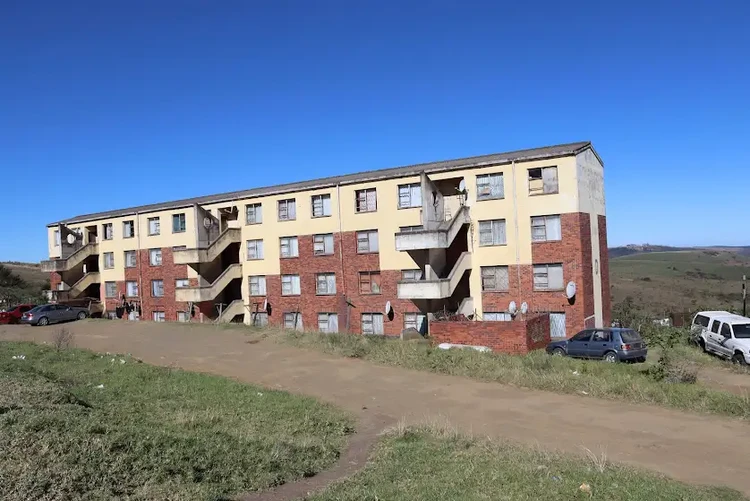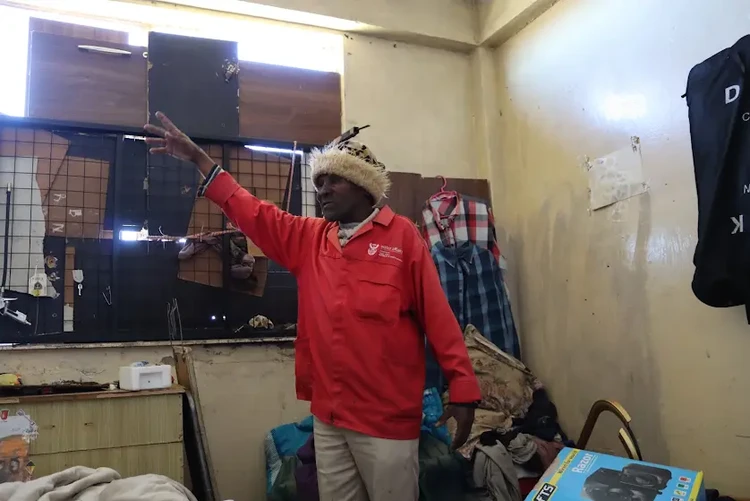Apartheid-era flats are “a ticking time bomb”
Residents want the broken-down flats fixed; the municipality says the residents must first pay rent
Municipal flats in Butterworth are a “ticking time bomb”, the municipality has acknowledged. Photos: Manqulo Nyakombi
- Three blocks of municipal flats in Butterworth are overcrowded and decaying.
- Residents say they won’t pay rent until the Mnquma Local Municipality fixes the flats.
- But the municipality says the flats can’t be fixed until rents are paid.
- Only 44 residents out of more than 500 are paying rent, says the municipality.
Families living in overcrowded and decaying apartheid-era municipal flats in Butterworth want the Mnquma Local Municipality to fix the flats; the municipality says the residents must first agree to pay rent. The result is a “ticking time bomb”, the municipal spokesperson says.
There are three blocks of flats owned by the local municipality, all built during the Transkei era between 1976 and 1987. Cuba Flats, built in 1987, has 192 family units with four and five-roomed structures. Ibika Township, built in 1976-77, has 144 family units. Msobomvu Township, built in 1976-78, has 192 family units.
Mnquma Local Municipality spokesperson Loyiso Mpalantshane said the flats were built to provide people with decent living spaces and to act as a source of revenue for the local authority at the time. But over the years, he says, the original tenants - police officers, teachers, nurses - have moved out and the flats have been occupied by illegal tenants. Some units have been hijacked by criminals, drug use is rampant and there are illegal shebeens.
At Cuba flats, just a few kilometres away from Butterworth centre, windows are broken, pipes and roofs leak, toilets don’t work. It’s clear there has been no renovation for years. Windows are covered with cardboard and planks. Some residents have put up zinc sheeting.
Mpalantshane said since 2015 the municipality had been trying to get residents to pay rent so that the buildings can be fixed. He says the current rent is R713 a month for a four-roomed flat and R967 for a five-roomed flat.
But residents say many of them are unemployed and they cannot afford to pay.
Resident Babalwa Daweti said she started living at the flats with her mother in 2008. She said the flats had been rented by government employees and people working in factories around Butterworth. When the factories closed in the late 1990s, some tenants had left. Backyarders and others had moved in to occupy the flats.
According to Daweti, the municipality agreed in 2015 that tenants should pay R120 a month, and that the flats would be repaired. Her mother had paid the R120 but had stopped in 2022 when the municipality failed to fix windows which had been broken by a storm.
“We had to use our money to fix them. If there’s a leakage we fix it ourselves, so what was the point of paying the municipality if they are not maintaining the flats,” said Daweti.
Her mother has since left and Daweti, who is unemployed, now lives in the flat with her two children. She says she can’t even afford R120 a month, never mind what the municipality is asking in rent.
Most residents GroundUp spoke to confirmed that they had moved in when the flats had emptied and that they had stopped paying rent.
Phathekile Kopolo shows broken windows in one of the flats.
Phathekile Kopolo, 77, says he arrived in Butterworth in 1972 and worked as a painter. When he started living in Cuba, he says, the rent was just R7 per month (equivalent to about R560 in 2024) for his five-roomed flat. His four daughters were born there. “Unfortunately they all passed away, I now live with my grandchildren and great-grandchildren. My eldest granddaughter lives in one of the flats,” said Kopolo.
Kopolo has paid for repairs to his flat but can’t afford to fix his granddaughter’s.
He said as a pensioner he can’t afford to pay the monthly rent of R967 for his flat.
Kopolo said before the elections residents had a meeting with officials from Mnquma. “In that meeting we asked to continue paying the R120 and the municipality must fix the windows, but there was no way forward. The officials promised to come back. We are still waiting,” he said.
Mpalantshane said he was not aware of “this arrangement of R120”, and the rents the municipality was asking were ridiculously low.
”The municipality needs that money to refurbish these buildings because in their current state they are a ticking time bomb due to the overcrowding and the dilapidation.”
He said the municipality had been talking to residents in all three blocks since 2015 in a bid to agree on rents. “Instead, our officials are met with hostility and violence by some of the residents, who also use opposition political parties to defend their unlawful occupation of municipal property. The municipality has made it crystal clear to the residents’ committees that no one will be evicted provided they come forward to arrange payment affordable to them.”
“In fact, Council resolved in June 2022 to write off the historic debt owed by flat tenants so that they can start with a clean slate, but even this seems to have had very little effect. Out of a total of 528 municipal flats, only 44 tenants paid their rent last month (June 2024). A drop in the ocean,” said Mpalantshane.
Support independent journalism
Donate using Payfast

Next: City of Joburg’s property error causes havoc for homeowners
Previous: Government contractor misses yet another deadline on R123-million Gauteng school
© 2024 GroundUp. This article is licensed under a Creative Commons Attribution-NoDerivatives 4.0 International License.
You may republish this article, so long as you credit the authors and GroundUp, and do not change the text. Please include a link back to the original article.
We put an invisible pixel in the article so that we can count traffic to republishers. All analytics tools are solely on our servers. We do not give our logs to any third party. Logs are deleted after two weeks. We do not use any IP address identifying information except to count regional traffic. We are solely interested in counting hits, not tracking users. If you republish, please do not delete the invisible pixel.


